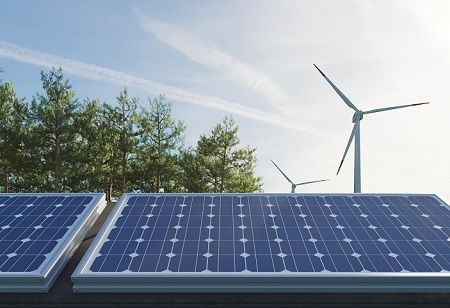
Intel, a chip manufacturing giant, successfully met 100% of its US Electricity use in 2015 with its purchase of 3.4 billion kilowatt-hours of renewable power produced from geothermal, wind, solar, low-impact hydro, and biomass sources. They have also installed the most extensive wind micro-turbine array in the USA, which has facilitated 18 on-site solar plants in its various facilities, indicating an installed solar capacity of around 7,000 Kilowatts and growing.
In this modern era, manufacturing firms have to focus on environmental consciousness. There is enormous pressure to lower carbon emissions, and it is crucial to stick to eco-friendly practices as the world is moving towards renewable energy sources for a greener economy.
Environmental Sustainability
Adapting sustainable measures has become the key, irrespective of every sector, and it is transforming the global manufacturing industry. Companies leverage various renewable energy sources such as hydroelectric power, wind energy, and solar energy to lower carbon emissions and mitigate climate change. From a technological point of view, data analytics and automation help firms optimize resource utilization and reduce waste. For manufacturers, attaining operational efficiency and brand reputation is the key, and by adhering to sustainable practices, they gain these with less intricacy. As there is an increasing awareness of sustainability, it has become essential for manufacturers to follow their daily practices, leading the industry toward a resilient and greener future.
For instance, Tesla, the automotive giant, has implemented environmentally sustainable practices in the manufacturing process. Their electric vehicles are manufactured to reduce environmental impact by reducing greenhouse gas emissions.
Samarth Kholkar, CEO & Co-founder, BLive says that “The need for to focus on clean mobility is more relevant and urgent than ever before. Alarming pollution levels and increasing fuel costs have necessitated the adoption of electric vehicles"
Cost savings
In this modern era, manufacturers are shifting to renewable practices and can gain various benefits in the long run. By improving resource utilization, they lower operational expenses and enhance competitiveness. They also invest massively in advanced technologies such as intelligent automation and LED lighting, which results in long-term cost savings while improving productivity. More importantly, companies have to focus on implementing circular economy principles through waste reduction and recycling, lowering raw material costs, and reducing environmental impact. Hence, to put sustainability goals into effect, firms should ponder strategic planning and innovation to unlock new avenues for profitability. Even with a budget-conscious approach, the manufacturers can improve their financial performance and nurture resilience in an ever-growing economic landscape.
General Motors has made considerable investments in renewable energy to redefine its manufacturing practices and secure cost savings. The firm has solar panels in many of its facilities to generate clean energy onsite, and by harnessing this, they consume less grid electricity and reduce energy expenses over time.
Energy security
Energy security plays a vital role in reshaping manufacturing landscapes through renewable energy adoption. In the past, manufacturing firms relied on traditional fuels, which caused sectors to experience geopolitical risks and price volatility. However, things have changed, and switching to renewables mitigates these challenges by diversifying energy sources and lowering dependency on limited resources. In manufacturing, stable and affordable energy availability is much needed for streamlined business operations and cost control. Hence, it is essential that manufacturing firms embrace renewables to secure their energy requirements sustainably, nurturing growth and stability. The major shift will assist the firms in stabilizing production and aligning with sustainability objectives, strengthening competitiveness in the dynamic markets.
For example, Apple Inc., a US-based technology firm, has significantly funded sustainable energy to guarantee energy security; they have built wind farms and solar arrays to power its facilities, which comprise offices, manufacturing facilities and data centers.
Regulatory compliance
Regulatory compliance ensures that the law and standards are followed, contributing to reliability and credibility in the manufacturing process. Consistently practicing compliance lowers the risk of penalties, lawsuits and brand image reshaping manufacturing landscapes. More importantly, investment in advanced clean technologies such as renewable energy infrastructure and pollution control systems ensures compliance with evolving regulatory systems. Moreover, firms must have transparent reporting and robust monitoring mechanisms that showcase commitment to environmental responsibility and nurture trust among potential investors. Adhering to compliance activities helps avoid fines and contributes to operational efficiency and innovation, which is essential for manufacturers to stay competent in the changing landscape.
Toyota, the manufacturing giant, has followed compliance standards and adopted strict regulations in its worldwide operations to reshape its manufacturing practices and ensure compliance with local and international laws.
All in all, adhering to renewable energy standards is not only the goal of the manufacturing industry but a global objective. It's high time for all industries, including manufacturing, to be a part of the renewable community and help the planet achieve sustainable objectives well before the expected time. By making use of the power of renewables, manufacturing firms can lower environmental concerns and costs, contributing to operational efficiency. Also, with frequent efforts from potential investors, industry experts, and policymakers, the objective of renewable-based manufacturing can be a reality, staying in a greener community and creating a more fantastic future for upcoming generations.

